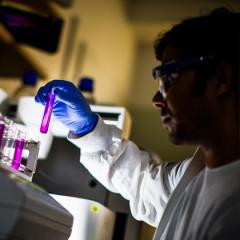University of Queensland researchers have successfully delivered the US Hexapro vaccine candidate in an animal model with the Vaxxas high-density microarray patch (HD-MAP).
The needle-free technology, originally discovered at the Australian Institute for Bioengineering and Nanotechnology, has been used to administer the COVID-19 vaccine candidate to successfully protect mice, demonstrating the potential of non-invasive delivery.
The high-density microarray patch (HD-MAP) is being commercialised through University of Queensland spin-out company Vaxxas and used to deliver the Hexapro vaccine candidate from the University of Texas.

The work was undertaken at UQ’s School of Chemistry and Molecular Biosciences (SCMB), providing protection against COVID-19 with a single, pain-free ‘click’ from a pocket-sized applicator in animal models.
SCMB’s Dr David Muller said the vaccine patch produced strong immune responses that were shown to be effective when the mice were exposed to SARS-CoV-2 – the virus that causes COVID-19.
“When the Hexapro vaccine is delivered via HD-MAP applicator – rather than a needle – it produces better and faster immune responses,” Dr Muller said.
“It also neutralises multiple variants, including the UK and South Africa variants.
“And it’s much more user-friendly than a needle – you simply ‘click’ an applicator on the skin, and 5000 microscopic projections almost-imperceptibly deliver vaccine into the skin.
"The UQ team, together with Vaxxas, hope to take the technology to the world and are looking for funding opportunities to accelerate to clinical trials as soon as possible."
Dr Muller said that Hexapro, delivered by the high-density microarray patch, could dramatically assist global vaccine rollout effort, particularly for billions of vulnerable people in low- and middle-income countries.
“We’ve shown this vaccine, when dry-coated on a patch, is stable for at least 30 days at 25 degrees Celsius and one week at 40 degrees, so it doesn’t have the cold chain requirements of some of the current options.”
Vaxxas was founded in 2011 by UQ’s commercialisation company, UniQuest.
President and CEO of Vaxxas, David L. Hoey, said he was extremely excited about the findings.
“These results are extremely clear – vaccination by HD-MAP produces much stronger and more protective immune responses against COVID-19 in model systems than via needle or syringe,” he said.
“We thank and recognise our incredible research collaborators at UQ for these important findings.
“The prospect of having a single-dose vaccine, that could be easily distributed and self-administered, would greatly improve global pandemic vaccination capabilities.”
This study was funded through an Advance Queensland Industry Fellowship in partnership with Vaxxas and Technovalia, with vital contributions from Professor Nigel McMillan and Griffith University’s Menzies Health Institute.
The research is currently in peer review and has been published in BioRxiv (DOI: 10.1101/2021.05.30.446357).
A video media release is available via Dropbox.
Media: Dr David Muller, d.muller4@uq.edu.au, +61 401 858 518; Dominic Jarvis, dominic.jarvis@uq.edu.au, +61 413 334 924.
PLEASE NOTE: The Hexapro vaccine candidate is not associated with the molecular clamp vaccine candidate previously being developed at UQ.


